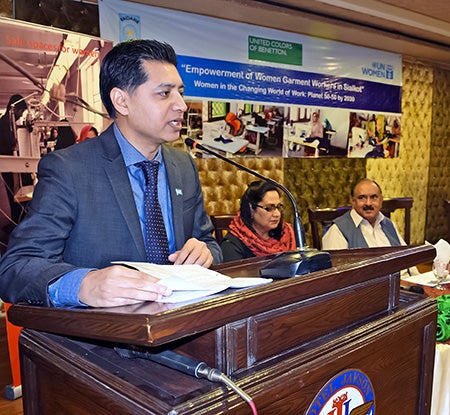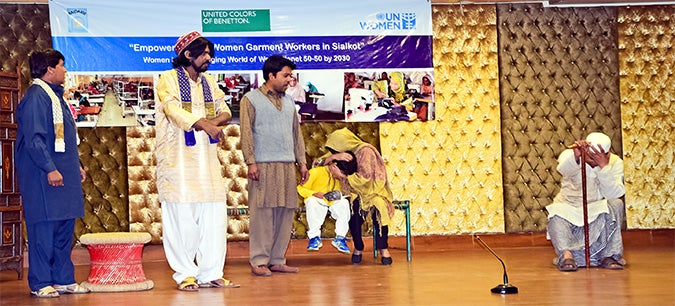Corporates from Sialkot Reaffirm their Commitment to Empowering Local Women
Date:
Author: Faria Salman
Pubjab, Pakistan — A group of national corporations and partners engaged in substantive initiatives to enhance economic opportunities and empowerment of local informal women workers in Sialkot, Punjab, on the occasion of International Women’s Day reaffirmed their commitment towards a Planet 50:50 by year 2030 and this year’s Women’s Day theme ‘Women in the Changing World of Work’.
The event, organized by Baidarie (a local partner) and UN Women (the United Nations Entity for Gender Equality and the Empowerment of Women) on 14 March 2017, brought together 30 informal women workers and representatives from local government, Trade Unions, judiciary, academia, activists, religious leaders, media, civil society and CEO signatories to the Women Empowerment Principles (WEP).

In welcoming guests Mr. Jamshed Kazi (Representative, UN Women, Pakistan) said “UN Women aims to empower women to be the owners of their own destiny and enable them to lead their lives in a self-reliant way in social, economic and political terms”. Mr Kazi commended the corporate sector in Sialkot for their support for advancing equality between women and men, and applauded the seventeen corporations who under a UN Women initiative had signed CEO Statements of Support to the WEP for their progressive approach in providing job opportunities to women in a non-discriminative, harassment-free and gender responsive environment. In concluding his remarks, Mr Kazi highlighted through the Benetton supported project ‘Empowerment of women garment workers in Sialkot’, 1,500 informal women workers will be linked to job opportunities in the formal sector.
Mr. Arshid Mehmood Mirza (Executive Director, Baidarie) in his remarks highlighted the dire state of affairs for women workers in Punjab. According to the Punjab Development Statistics (2015-2016) women constitute 48 per cent of Punjab’s population whilst the women workforce participation rate in Pakistan is 25% based on UNDP’s Human Development Report (2015). “All of these indicators reveal the deprivations of Pakistani women, and also reinforce the need for additional focused and attention for meticulously designed initiatives, which are tangible and lead to the socio-economic empowerment of women” he said. Speaking of the WEP, Mr Mirza said “Globally 1,534 corporate entities have signed the WEP, which are jointly framed by UN Women and UN Global Compact (UNGC). We are working to have a further 15 organizations from Sialkot commit to gender equality in the workplace, and sign the WEP.”
In opening a panel discussion on ‘Women’s Role and Support Required in the Changing World of Work’, Ms. Hina Noureen (President, Baidarie) highlighted that “An overwhelming majority of women workers are engaged in the informal sector of economy, who have to share a double burden of completing job related assignments and taking care of domestic duties. These women are concentrated in lower-paid, lower-skill occupations with little or no social protection, and are frequent victims of harassment and violence in the indoor/outdoor life and workplace. There therefore is imperative need of achieving gender equality in the world of work to pace up the process of sustainable development.”
Panel members included Ms. Ayesha Zaka (Member Women Entrepreneur Committee SCCI, Trustee Sialkot Dry Port Trust), Dr. Khurram Anwar Khawaja (Managing Director, Anwar Khawaja Industry), Mr. Amjad Ali (Deputy Director, Labour and Human Resources Department Punjab), Ms. Uzma Zarrin (Government College Women University, Sialkot) and Ms. Shahnaz Kanwal (UN Women project beneficiary). Ms. Zaka stated “There is a women’s entrepreneur committee functional in Sialkot Chamber of Commerce and Industry which facilitates job placement and internships for girls and women”. Mr. Ali said “By amending the Factories Act (1934), the Punjab Government has made it compulsory for (i) All Executive Boards to have fair representation of women (at least 33 per cent); (ii) No discrimination in wages between women and men, meaning equal work, equal pay; and (iii) Day-care centers to be established in all factories”. Ms. Zarin added “We have 5,000 girl students acquiring education in the University. Some are also registered with Leather Product Development Institute for skills development. It is envisaged that these technical skills will help them get jobs. Our girls have a lot of potential, the Government and private sector should provide more opportunities so we can excel in all fields”. Ms. Kanwal shared “At work, women and girls have a collective responsibility to act and behave in a dignified manner becoming a role model for others.”
In his remarks Mr. Muhmmad Usman (Chief Guest and Secretary Punjab Commission on the Status of Women) reiterated the Government’s resolve to provide equal opportunities for development to all the citizens, particularly women evident through the Protection against Harassment of Women at the Workplace Act (2010), the Punjab Protection of Women against Violence Act (2016) and formation and functioning of the Punjab Commission On the Status Of Women. He apprised guests of an initiative being developed to increase the current 5 per cent quota of women employed with government offices to 15 per cent.
The event concluded with a theatrical performance ‘Mehnat vich mehna ki’ (There is nothing derogatory in doing hard work) by Azad Theater aimed at male family members to give more spaces to women to socially and economically empower them and women’s resulting contribution to productive households and societies.

This is what two Sialkot based signatories to WEP, had to say about the Principles and what it means for them in changing the world of work for local women:
Dr. Khurram Anwar Khawaja (Managing Director, Anwar Khawaja Industries (Pvt) Ltd)
"Signing the WEP has introduced new dimensions to our corporate vision. With a renewed passion and commitment for gender responsiveness employment practices, we are welcoming more and more women workers into our manufacturing chain whose practices and operations are regulated by the basic principles and values of human dignity, respect of the workforce and equal opportunities for all.”
Khawaja Musharraf Iqbal (Managing Director K.M. Ashraf & Sons (Pvt) Ltd)
"Becoming a WEP signatory has definitely led us to emerge and evolve as a business entity having a softer and more responsible image. Not only we have opened our doors to the women workers to work in a harassment free atmosphere having all the legally admissible rights and privileges but they are being provided spaces to rise to the level of supervisory and managerial tiers in our group. This process has begun from our home; my mother, wife, daughter and daughter-in- law, are all an integral part of family decisions. We foresee K.M.Ashraf & Sons (Pvt) Ltd will assume a leadership role in the corporate sector as a gender responsive equal opportunity employer."
For more information contact:
Faria Salman
Strategic Management and Partnerships Officer & Head of Communications for UN Women Pakistan
Email: faria.salman@unwomen.org